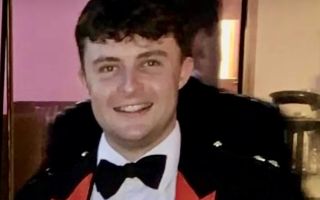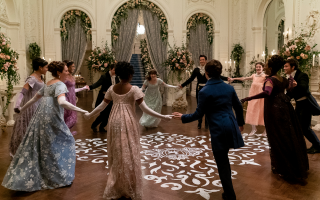Preparations, pride and personal connections for Household Cavalry Mounted Regiment
Members of the Household Cavalry Mounted Regiment – the ceremonial face of the Household Cavalry – have been carrying out their final preparations ahead of the VE Day 80 parade.
First thing in the morning the horses were taken out for their usual exercise, which allows them to let off a little bit of steam so they're not too excited when the ceremonial part of their day begins.
With the ride over, horses and riders are fitted out in their full state kit, which requires an incredible amount of work.
Trooper Warren Fagioli said: "I'm currently cleaning my bosses and my stirrups ready to go and parade.
"We've just come off a ride... exercising some of the more lively horses, so when they're on parade, they don't mess about as much."
He said of the horse tack: "These need to be as shiny as they can. Same with your stirrup irons and your leathers.
"I'd say [it takes] about three to four hours, so yesterday I finished at 07:00 with kit, and that's me done. Then in the morning, you have to groom your horse and still go over your kit as well."
Tpr Fagioli explained what it meant to be a part of VE Day 80, saying: "It's such a big anniversary. I think it's just a once-in-a-lifetime thing. I never imagined three years ago that I'd be doing this today.
"I'm here on this job, it's a brilliant job as well."
A farrier with the regiment, Lance Corporal of Horse Carl Greenhow, said all the horses would be checked after their morning exercise to see if any last-minute shoeing was required.
LCoH Greenhow was asked whether he had any personal connections to the Second World War, and replied: "I do have a couple, but one stands out. It was my great grandmother's cousin.
"His name was Flight Sergeant Eric Howard and he served in the RAF. He was a bomb aimer in a Lancaster bomber, and was shot down in March of 1945.
"It wasn't until recently, in 2021, when they actually discovered his wreckage and actually identified who the plane belonged to."
Understanding what happened
He said he had been given a full report which had helped him understand what happened.
"As I was growing up, we only had fragments of the story. We didn't actually have the full truth," he explained.
"And after hearing the full story from what the German archaeological scene investigators have found - and a Canadian family with the surname Ling, they found a lot of information which has given us a little bit of closure within our family.
LCoH Greenhow said it was important to know what had happened, adding: "It's something that I could pass on to my son and within the family and for generations to come.
"[It's] very important, helps with remembering. A bit of reflection, a bit of remembering. It's a bit of pride as well."
"I think every soldier that'll be taking part will definitely have that kind of reflection and that remembrance."







